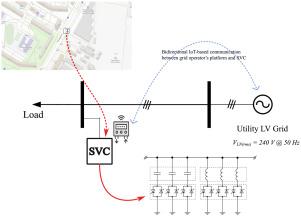Performance evaluation of a low-voltage SVC utilizing IoT streamed data for distribution systems
IF 3.3
3区 工程技术
Q2 ENGINEERING, ELECTRICAL & ELECTRONIC
引用次数: 0
Abstract
This paper presents the design, implementation, and performance evaluation of a novel 50 kvar Static Var Compensator (SVC) integrated with an Internet of Things (IoT) controller for a low-voltage power distribution system in Moscow. This integration enhances real-time monitoring and control capabilities over traditional SVC systems. The study focuses on advanced control systems for reactive power compensation, voltage stabilization, and overall system efficiency. Data collected over two months demonstrate the SVC’s effectiveness in maintaining a stable power factor close to unity and reducing reactive power demand. The device successfully kept voltage levels within acceptable limits across all phases, reducing fluctuations and ensuring balanced voltage levels. Key findings include enhanced reactive power compensation, voltage stabilization (minimum voltage not less than 218 V), improved system efficiency (reactive power demand from the source near zero most of the time), and significant improvements in power quality and grid stability. The case study at Kosinskaya Street, Moscow, confirms the device’s role in improving power quality and grid stability. These results support the broader deployment of IoT-integrated SVC technology in low-voltage power distribution systems.

利用物联网流数据对配电系统低压 SVC 进行性能评估
本文介绍了一种新型 50 kvar 静变量补偿器(SVC)的设计、实施和性能评估,该补偿器与物联网(IoT)控制器集成,用于莫斯科的低压配电系统。与传统的 SVC 系统相比,这种集成增强了实时监测和控制能力。研究重点是无功补偿、电压稳定和整体系统效率的先进控制系统。两个月来收集的数据证明了 SVC 在维持接近统一的稳定功率因数和减少无功功率需求方面的有效性。该装置成功地将各相电压水平保持在可接受的范围内,减少了波动,确保了电压水平的平衡。主要发现包括无功功率补偿增强、电压稳定(最低电压不低于 218 V)、系统效率提高(大部分时间电源的无功功率需求接近于零)以及电能质量和电网稳定性显著改善。莫斯科 Kosinskaya 街的案例研究证实了该设备在改善电能质量和电网稳定性方面的作用。这些结果支持在低压配电系统中更广泛地部署物联网集成 SVC 技术。
本文章由计算机程序翻译,如有差异,请以英文原文为准。
求助全文
约1分钟内获得全文
求助全文
来源期刊

Electric Power Systems Research
工程技术-工程:电子与电气
CiteScore
7.50
自引率
17.90%
发文量
963
审稿时长
3.8 months
期刊介绍:
Electric Power Systems Research is an international medium for the publication of original papers concerned with the generation, transmission, distribution and utilization of electrical energy. The journal aims at presenting important results of work in this field, whether in the form of applied research, development of new procedures or components, orginal application of existing knowledge or new designapproaches. The scope of Electric Power Systems Research is broad, encompassing all aspects of electric power systems. The following list of topics is not intended to be exhaustive, but rather to indicate topics that fall within the journal purview.
• Generation techniques ranging from advances in conventional electromechanical methods, through nuclear power generation, to renewable energy generation.
• Transmission, spanning the broad area from UHV (ac and dc) to network operation and protection, line routing and design.
• Substation work: equipment design, protection and control systems.
• Distribution techniques, equipment development, and smart grids.
• The utilization area from energy efficiency to distributed load levelling techniques.
• Systems studies including control techniques, planning, optimization methods, stability, security assessment and insulation coordination.
 求助内容:
求助内容: 应助结果提醒方式:
应助结果提醒方式:


